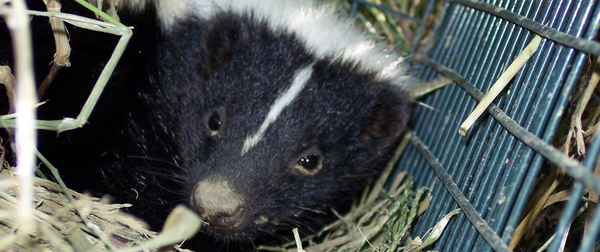- info@wildlife-removal.com
Call us for help in your town
Wildlife Removal Education
What Are The Symptoms of A Sick Skunk?
Need skunk removal in your hometown? We service over 500 USA locations! Click here to hire us in your town and check prices - updated for year 2020.
It is important that individuals in skunk prone areas learn of these symptoms, especially as it appears to a rabid skunk. They include:

Diarrhea. The emptying of the waste matter from the bowels of a skunk. This occurs more frequently than normal and the waste is in liquid form.
Weight loss. A sick skunk will lose some weight and it will look sick and pale.
Seizures. This is a sudden loss of movement of the body, it may be accompanied by foam coming out of the mouth of the skunk.
Scratching of the body. When a skunk is sick due to the actions of parasites like lice, fleas or mites, it scratches its body frequently.
Eyes or nose discharges. Liquid matter usually comes out of the nose and/or eyes of a sick skunk.
Excessive ear wax. Presence of more than normal wax in the ears of a skunk also indicates sickness.
Yellowing of the skin coat. The white colored part of the skin coat of a sick skunk will appear yellow.
Heavy bleeding. Heavy bleeding from any part of the body is an indication that a skunk is sick.
Loss of Appetite. A skunk that suddenly loses its appetite is likely to be sick. Change of feeding routine can also be a pointer to sickness in skunks.
Tremors. Tremors refers to a continuous shaking of the body due to problems in the animal’s nervous system. This will eventually weaken the skunk that suffers from it.
Limping. This may be as a result of sickness or injury to the skunk; either way, the skunk is not in a good health condition.
Lethargy. This refers to a total weakness in the body of the skunk. The weakened skunk will be mostly inactive, laying about.
Constant thirst. You may never notice this symptom except you keep the skunk as pet. If your skunk pet constantly drinks water, it is probably sick.
Being active during the day. This could be misleading as there are other reasons that could make a skunk to be active during the day, but on rare occasion, sickness makes a skunk active during the day.
Pale teeth and loss of tooth. When a skunk suddenly starts losing its tooth, it may be as a result of sickness. Pale teeth is another sign of a sick skunk.
Other symptoms of a sick skunk include unconsciousness, coughing, dry and lifeless coat, and loss of balance.
Go back to the Skunk Removal page.


















